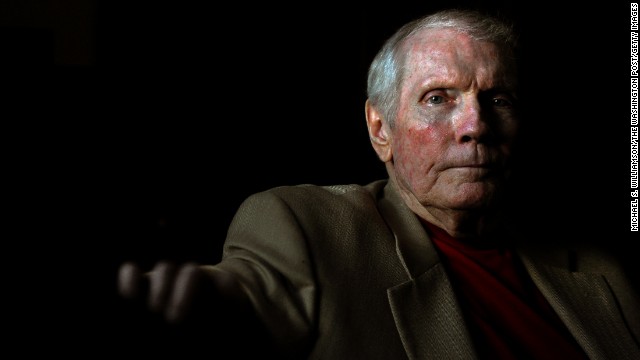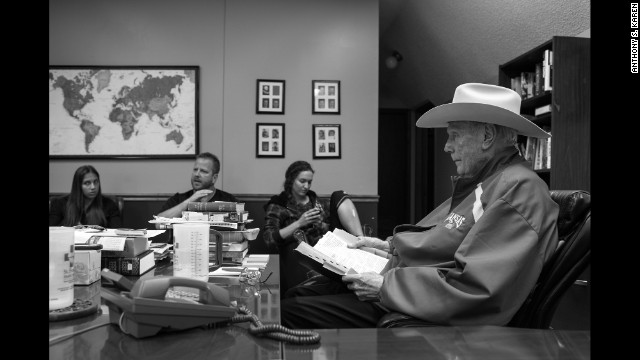
Anti-gay Westboro church founder dies
STORY HIGHLIGHTS
- Church spokesman says Phelps died late Wednesday of natural causes
- Phelps founded Westboro Baptist Church in Topeka, Kansas
- The church is known for its virulently anti-gay protests, including at military funerals
The 84-year-old died of natural causes at 11:15 p.m. Wednesday, according to church spokesman Steve Drain.
Phelps founded Westboro
Baptist Church of Topeka, Kansas, in 1955 and molded it in his
fire-and-brimstone image. Many members of the small congregation are
related to Phelps through blood or marriage.
In a statement Thursday, the church chided the "world-wide media" for "gleefully anticipating the death."
 Photos: Pastor Fred Phelps
Photos: Pastor Fred Phelps
 2003: Phelps on Matthew Shepard statue
2003: Phelps on Matthew Shepard statue
 Photos: People we lost in 2014
Photos: People we lost in 2014
"God forbid, if every
little soul at the Westboro Baptist Church were to die at this instant,
or to turn from serving the true and living God, it would not change one
thing about the judgments of God that await this deeply corrupted
nation and world."
According to Westboro,
the church has picketed more than 53,000 events, ranging from Lady Gaga
concerts to funerals for slain U.S. soldiers. Typically, a dozen or so
church members -- including small children -- will brandish signs that
say "God Hates Fags" and "Thank God for Dead Soldiers."
Phelps was often called "the most hated man in America," a label he seemed to relish.
"If I had nobody mad at
me," he told the Wichita Eagle in 2006, "what right would I have to
claim that I was preaching the Gospel?"
Under Phelps' leadership,
Westboro members have preached that every calamity, from natural
disasters to the Sandy Hook Elementary School shooting in Newtown,
Connecticut, is God's punishment for the country's acceptance of
homosexuality. Phelps had advocated for gays and lesbians to be put to
death.
"Fred Phelps will not be
missed by the LGBT community, people with HIV/AIDS and the millions of
decent people across the world who found what he and his followers do
deeply hurtful and offensive," the National Gay and Lesbian Task Force
said in a statement.
Phelps began his
anti-gay protests in Wichita in 1991 after complaining that the city
refused to stop gay activities in a public park. He rose to national
notoriety in 1998, when Westboro members picketed at the funeral of
Matthew Shepard, a Wyoming man who was tortured and murdered because he
was gay. Phelps and his church carried signs that said Shepard was
rotting in hell.
The Southern Poverty Law Center calls Westboro Baptist Church "arguably the most obnoxious and rabid hate group in America."
In 2011, the Supreme
Court upheld Westboro's right to picket military funerals on free speech
grounds. Congress and several states, though, have passed laws aimed at
keeping church members at a distance from funerals.
In 2013, more than
367,000 petitioners called on the White House to legally recognize
Westboro Baptist Church as a hate group. The White House called
Westboro's protests "reprehensible" but said that "as a matter of
practice, the federal government doesn't maintain a list of hate
groups."
Anti-gay preacher once fought for civil rights
Born in Meridian,
Mississippi, on November 29, 1929, Phelps had his sights set on West
Point before he attended a Methodist revival. He said the sermon
inspired him to enter the ministry.
"I felt the call, as
they say, and it was powerful," Phelps told the Topeka Capital-Journal
in 1994. "The God of glory appeared." Later, Phelps was ordained by a
Southern Baptist church in Utah.
He bounced around several Christian colleges as his preaching and his theology took a hard right turn.
A Time magazine article
from 1951 describes Phelps as a "craggy-faced engineering student" who
harangued fellow students about the dangers of promiscuity and
profanity.
Tim Miller, a professor
of religious history at the University of Kansas who has studied
Westboro Baptist Church, said Phelps liked to consider himself a
"primitive Baptist preacher who held to the old ways."
Despite its "Baptist"
name, Westboro is not affiliated with any larger church denomination.
Most Christians criticize the congregation's harsh anti-gay rhetoric and
penchant for pursuing the limelight at inappropriate moments.
Phelps married his wife,
Marge, who survives him, in 1952. The couple moved to Topeka on May 4,
1954, the day the Supreme Court handed down its landmark decision Brown
v. Board of Education, which desegregated public schools.
Phelps interpreted that
as a sign and soon began a law career that centered on civil rights,
winning awards for his work and praise from local leaders.
"Most blacks -- that's
who they went to," the Rev. Ben Scott, president of the NAACP's Topeka
branch, told CNN in 2010. "I don't know if he was cheaper or if he had
that stick-to-it-ness, but Fred didn't lose many back then."
Phelps was disbarred
from practicing law in state courts, however, after being accused of
badgering a witness and making false claims in court affidavits. The
Kansas Supreme Court said that Phelps "has little regard for the ethics
of his profession."
Phelps surrendered his
license to practice law in federal courts in 1989, according to the
Topeka Capital-Journal, after nine U.S. District Court judges filed
disciplinary complaints against him.
Most of the members of
Phelps' Westboro Baptist Church are members of his large family. Phelps
has 13 children; 11 are attorneys. One son, Nathan, is estranged from
his father and from organized religion. He is an atheist.
Nathan Phelps posted a
Facebook message March 15 saying that his father had been excommunicated
from the church. Later, though, Nathan Phelps said it was "unclear"
whether his father had been expelled from Westboro.
A church statement
issued on March 16 said that "membership issues are private" and that
eight unnamed elders lead the congregation.
On Thursday, the church
added, "Listen carefully; there are no power struggles in the Westboro
Baptist Church, and there is no human intercessor -- we serve no man,
and no hierarchy, only the Lord Jesus Christ."
For years, Phelps joked
about the possibility that his own funeral would draw protests. During a
sermon in 2006, he said a CNN reporter once asked how he would feel if
that occurred.
"I'd love it. I'd invite
them," Phelps told the reporter, according to the Wichita Eagle. "I
said: 'I'll put in my will to pay your way. But not first class.' "
But Shirley Phelps-Roper, Phelps' daughter, said Westboro will not hold a funeral for its patriarch.
"We do not worship the dead," Phelps-Roper told CNN.
 Protest leader Suthep Thaugsuban
greets supporters during a march in Bangkok, Thailand, on Monday,
February 3. Anti-government protesters disrupted voting in roughly
one-fifth of Thailand's electoral districts in national elections
Sunday, February 2, authorities said.
Protest leader Suthep Thaugsuban
greets supporters during a march in Bangkok, Thailand, on Monday,
February 3. Anti-government protesters disrupted voting in roughly
one-fifth of Thailand's electoral districts in national elections
Sunday, February 2, authorities said.




 Manchester United v Bayern Munich:
Bayern manager Pep Guardiola will likely be pleased with the draw
against struggling Manchester United, who progressed despite a shaky first-leg loss to Greek side Olympiakos.
Manchester United v Bayern Munich:
Bayern manager Pep Guardiola will likely be pleased with the draw
against struggling Manchester United, who progressed despite a shaky first-leg loss to Greek side Olympiakos.




